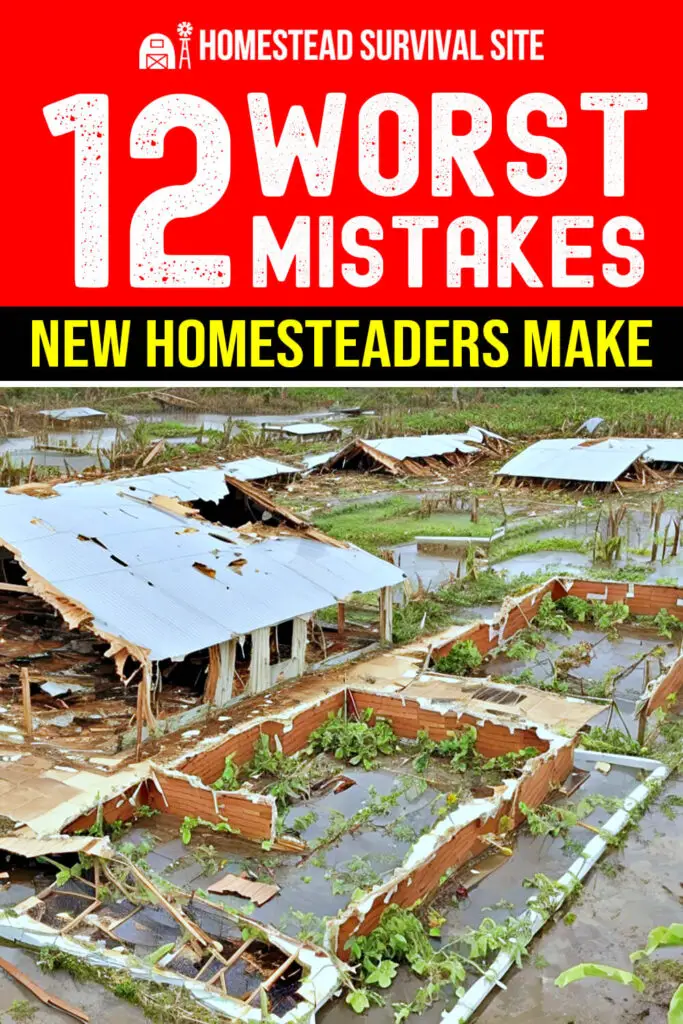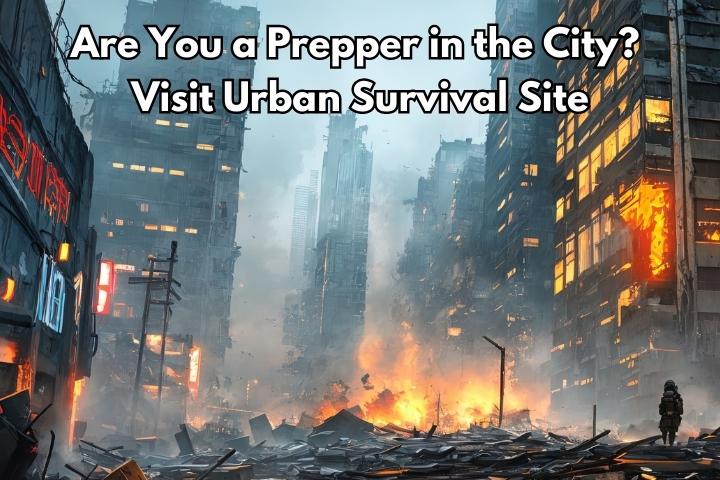Estimated reading time: 7 minutes
Living a self-sustainable lifestyle on a homestead where you can take care of your own land, plants, and animals can be very satisfying. For many people, the idea of not being dependent (or at least less dependent) on outside sources for food or other resources makes them feel free.
If homesteading appeals to you for the same reasons, you should know that there are several critical homesteading mistakes that are very easy to make, especially if you're a newbie. These mistakes will only serve to cripple your homesteading adventure, so it’s important that you're aware of them and how to avoid them.
Here are the worst mistakes that new homesteaders make.
Want to save this post for later? Click Here to Pin It On Pinterest!
1. You Neglect to Plan
This may seem obvious, but it’s worth mentioning. The last thing you want to do is decide to homestead and jump right into it tomorrow or next week without actually planning ahead.
The key to homesteading successfully is to plan it out in as much detail as possible. Know what your goals are, and actually write them down. But be realistic about it as well.
You need to figure out your budget, the cost of the land, any home renovations that need to be made, the cost of livestock, your projected revenue, and so on. Give a specific date for when you want each goal/task to be done.
Things won't go exactly as you plan (they never do), but your plan will act as a compass that keeps you heading in the right direction.
2. You Don’t Set A Budget
This is perhaps the mother of all homesteading mistakes because when your finances fall apart, your homesteading dreams fall apart with it. Don’t take on a new project, add to your garden, or buy new livestock until you are absolutely certain you can afford it.
You also need to determine how much cash you need for animal feed, seeds, soil, water, pots, canning equipment and so on. Set a monthly budget and stick to it.
3. You’re Unrealistic
People who make unrealistic plans don't usually realize they're being unrealistic. You need to fully understand your limitations rather than try to take on the whole world. Ask yourself if your goals are really achievable in the time frame you have in mind.
Want to start a homestead but not sure how?
Click Here to get a FREE book, "How To Homestead No Matter Where You Live."
For example, building a chicken coop and raising a few chickens is a perfectly realistic goal that almost everyone can accomplish. But building a chicken coop, raising chickens, building a fence, clearing trees, and digging a well all in the first week isn't realistic. That’s only a recipe for burning yourself out, which could cause you to give up and crush your homesteading dreams in a short period of time.
Make sure each goal is realistic, and then break them down into smaller tasks that you can tackle one at a time. And remember, slow and steady wins the race. Keep yourself busy, but remember that setting up a homestead takes time.
4. You Select a Poor Location
Just because a specific piece of property looks great in the summer doesn’t mean it will look great in the winter. During the summer, the property you are considering may look peaceful and heavenly, with low winds and a bright sun. But that could all change when the season or the weather changes.
Carefully research your property and inquire with the locals about how things are later or earlier in the year. You also need to make sure your location provides you with everything you want or need, including suitable farming land, enough space for raising livestock, a natural source of running water, suitable ground for digging a well, and so on.
5. You Make Your House Too Large
One of the great appeals of living in a rural area is the lack of building restrictions. This gives you the freedom to build your home the way you see fit–and as large as you see fit.
However, you don’t want to get carried away. Keep your budget in mind and don’t seek to make your house larger than you can afford. You’re going to have plenty of other expenses, too.
Furthermore, having a large house means having more space to heat and maintain, which can cost you more over the long run. A simple twelve hundred square foot house is far from a mansion, but it should be adequate for an average family of four or five and will take a lot less power.
6. You Ignore Your Community
One of the secrets to homesteading successfully is working with other people in the area to trade resources and knowledge. In fact, your local community is going to become a vital component of your homesteading experience, so ignoring your community is a major mistake (not to mention it makes you come across as rude).
By engaging with your community, you will likely be pleasantly surprised by all the generosity and kindness you're shown by the locals.
7. You Expect Your Garden to Feed Your Family Within a Year
Yes, one of the appeals of homesteading is that you aren’t reliant on outside sources for food. But that doesn’t mean you’ll be entirely feeding yourselves at first. On the contrary, it’s unrealistic to think that you will be totally self-reliant on food within the first year or two.
There’s a serious learning curve to raising livestock and growing gardens, and you’re going to be making a lot of mistakes that you learn from. Therefore, for the first year or two, you’re still going to be buying groceries.
8. You Overestimate Your Energy and Time
Many new homesteaders get enthralled by the romanticism of the lifestyle, not realizing the sheer amount of labor it demands. Homesteading is a full-time job and then some.
From tending to livestock to maintaining your garden, there's always work to be done. It's essential to have a clear picture of the daily tasks and allot time realistically. Ignoring this can quickly lead to exhaustion and burnout.
9. You Ignore Natural Predators
When setting up a homestead, one might forget about the local wildlife. Your chickens, gardens, and even livestock can fall victim to predators such as foxes, raccoons, hawks, and many others.
It's essential to understand the local wildlife ecosystem, install proper fencing, and create protective environments for your animals and plants. Not doing so can result in significant losses and even endanger your own safety.
Want to start a homestead but not sure how?
Click Here to get a FREE book, "How To Homestead No Matter Where You Live."
10. You Don't Continue Educating Yourself
The world of homesteading is vast and always evolving. Techniques that worked a few years ago might be outdated today. To make your homestead thrive, you need to be continuously learning, be it about new gardening methods, animal husbandry, or sustainable building techniques.
Engage in local workshops, read up on the latest books, and join online forums to ensure you're always equipped with the best knowledge.
11. You Fail to Prepare for Emergencies
When you're out on your land, far from urban amenities, emergencies can escalate quickly. Whether it's a medical emergency, a sudden frost, or equipment failure, being unprepared can have serious consequences.
Always keep an emergency fund for unforeseen expenses, maintain a stocked first-aid kit, and have a plan in place for various possible scenarios. This not only ensures your safety but also the continuity of your homesteading journey.
The path to successful homesteading is filled with challenges and learning opportunities. By being aware of these potential pitfalls and preparing for them, you can create a flourishing and sustainable homestead that brings joy and fulfillment.
12. You Don’t Learn From Your Mistakes
Maybe we’re cheating with this one, but again, you’re going to be making lots of mistakes especially in your first year of homesteading. If you fail to learn from those mistakes, you’re only going to encounter more problems down the road.
Like this post? Don't Forget to Pin It On Pinterest!




Leave a Reply